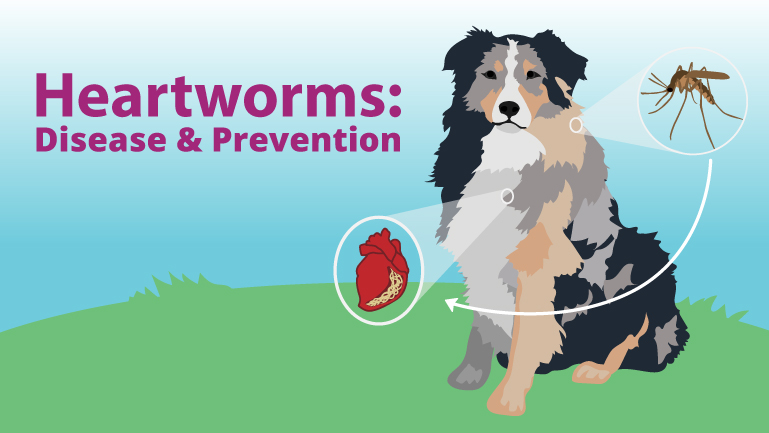Heartworm Disease Prevention
It is a common opinion among most individuals that the worst part of summer is the prevalence of mosquitoes—they’re annoying, they make you itch, they ruin camping trips and long nights under the stars. What is perhaps less commonly known, however, is that mosquito season can pose a serious threat to your cats and dogs. Mosquitoes are the most common urban carriers of heartworm larvae, which can develop into foot-long parasitic worms and live in the hearts, lungs, and blood vessels of affected pets. Heartworms have been known to cause severe lung disease, heart failure, and organ damage in hosts such as dogs, cats, and ferrets, and if left untreated, have taken the lives of many pets across America 1).
Heartworms in Dogs
Dogs are typical hosts for heartworms. This means that conditions are ideal inside your dog’s body for heartworms to mature, mate, and reproduce (1). Because of this, untreated dogs can end up harboring hundreds of mature heartworms. Unimpeded, this disease can permanently affect your dog’s quality of life, leaving them with severe damage to their heart, lungs, and associated arteries. While there are few visible symptoms in the early stages of the disease, symptoms will certainly develop as time goes on. According to the American Heartworm Society, signs to look for include “a mild persistent cough, reluctance to exercise, fatigue after moderate activity, decreased appetite, and weight loss”. (1)
Heartworms in Cats
Cats are considered atypical hosts for heartworms, meaning any heartworms present in cats are not likely to mature to adulthood. Regardless, heartworms (immature or otherwise) can still cause a lot of damage to cats. Despite their name, heartworms in cats are more likely to affect a cat’s lungs, ultimately causing Heartworm Associated Respiratory Disease, or HARD (2). Symptoms of heartworm disease in cats range from very subtle to very conspicuous; most common is intermittent vomiting and diarrhea, but asthma-like attacks, weight-loss, and a lack of appetite are also likely to occur (2). More severe symptoms include fainting, seizures, difficulty walking, and fluid accumulation in the abdomen. Unfortunately for some pet owners, sudden death can occasionally be the first and only warning sign of the disease (1).
How Pets Get Heartworms
Heartworms can only be contracted from an infected mosquito—and one bite is all it takes (3). When a mosquito pierces your pet’s skin, it allows the entry of heartworm larvae into your pet’s bloodstream. Depending on the host animal, it will only take about 7 months for heartworms to mature and begin causing damage (3). Though heartworms are more prevalent in certain regions of the United States (particularly the southeast), the disease has still been diagnosed in all 50 states3. Because risk factors are impossible to predict, and because both outdoor and indoor pets are in danger of contracting heartworms, the American Heartworm Society encourages all pet owners to “think 12”: “(1) get your pet tested every 12 months for heartworms and (2) give your pet heartworm disease preventive 12 months a year” (1). Heartworm disease is a serious, progressive condition with very few early-warning signs, so the sooner you get your pet on a preventative treatment program, the safer your pet will be.
Preventing Heartworms
The good news is that heartworms can be easily prevented. For less than what you spend on coffee every week, your pet can be given monthly heartworm preventative medication, or monthly topicals for your pet’s skin. Depending on the weight of your pet, the annual cost of medicine is around $35-$80, which is a small price to pay compared to the cost of treating an infected pet (around $300-$1000) (3). These preventatives are highly effective and can spare you and your pet a great deal of suffering.
It is imperative to never miss a month’s dose if your pet is on a preventative regimen (even during the winter months, when mosquitoes are less prevalent). Annual heartworm screenings during your pet’s routine vet checkup can help determine the efficiency of the preventative as well as catch any potential heartworms before they can cause serious damage. If you suspect that your pet has contracted heartworms, do not hesitate to speak to your vet—the earlier your pet is diagnosed, the better.
With summer fast approaching, it is more important than ever to talk to your vet about the dangers of heartworms. Heartworm disease can be avoided entirely with consistent use of the right preventative, rendering mosquitoes as annoying pests once more instead of serious threats to your pet’s wellbeing.
Takeaway Points
- Prevention over treatment!
- Heartworms are transmitted by mosquitoes, meaning every pet has a risk of contracting them.
- Heartworms can cause severe damage to your pet’s heart, lungs, arteries, and other organs. Untreated cases may be fatal.
- S Think 12! Check for heartworms every 12 months and administer a preventative 12 months a year.
- Preventatives are crucial to keep your pet safe and healthy (and are very cost effective).
Sites Referenced
- “Heartworm Basics.” American Heartworm Society – Heartworm Basics. N.p., n.d. Web. 05 May 2017.
- “Heartworm in Cats.” College of Veterinary Medicine – Cornell University. N.p., n.d. Web. 05 May 2017.
- Eckstein, Sandy. “Heartworms in Dogs: Facts and Myths.” WebMD. WebMD, n.d. Web. 05 May 2017.







